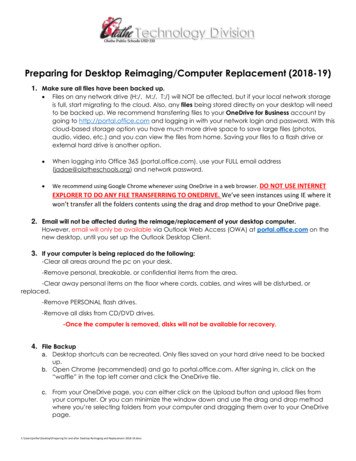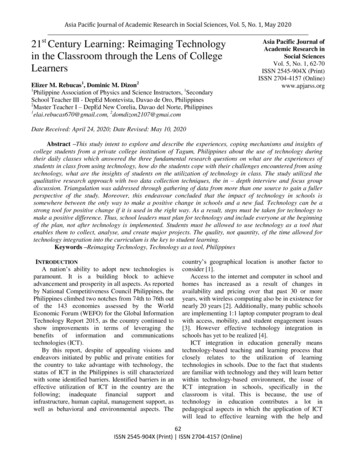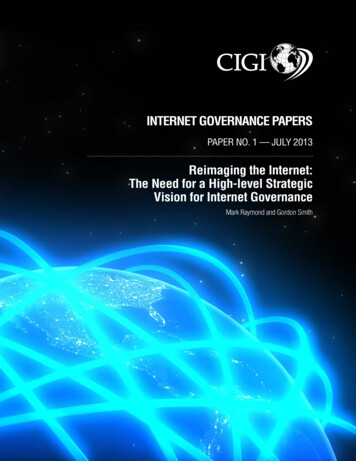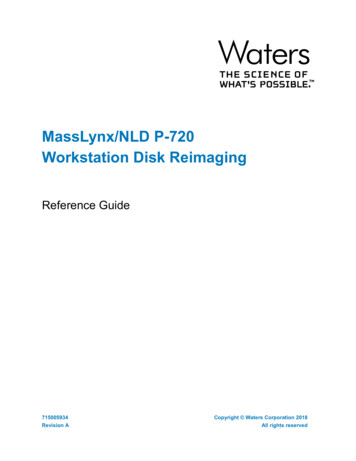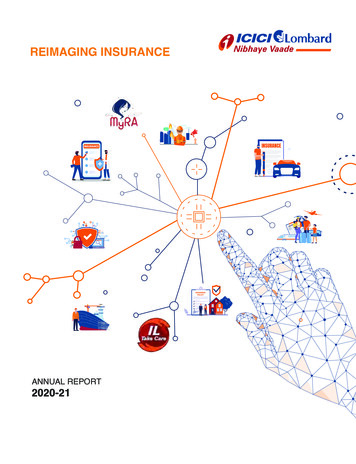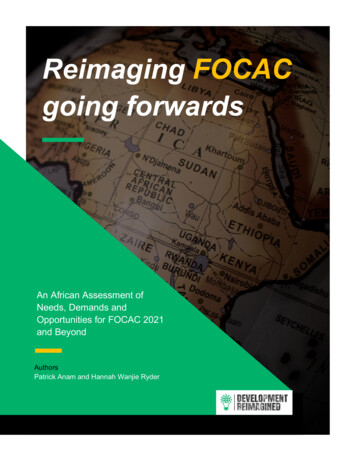
Transcription
Reimaging FOCACgoing forwardsAn African Assessment ofNeeds, Demands andOpportunities for FOCAC 2021and BeyondAuthorsPatrick Anam and Hannah Wanjie Ryder
Reimaging FOCAC going forwardsTABLE OF CONTENTSAcknowledgements . 2Executive Summary . 3Introduction - Why this report? . 7Approach and Methodology . 8Why is China – Africa Cooperation Important – Chinese perspectives . 9Why is China – Africa Cooperation Important – African perspectives . 12The Forum on China – Africa Cooperation (FOCAC) over time and in context – a synopsis . 17Comparisons – what can be learnt from China’s other FOCAC-like mechanisms? . 21Comparisons - Do African countries have other FOCAC-like mechanisms? . 24FOCAC’S Impact to Date – two case studies . 29The African Union’s Development Framework . 29The Case Study of China- Africa Cooperation on Agriculture – What Impact? . 35Africa’s Existing Agricultural Plans . 37How can China-Africa cooperation better link to African agricultural development needs? . 37The Case Study of China – Africa Cooperation on Health – What Impact? . 38Africa’s Existing Health Sector Development Plans . 41How can China-Africa cooperation better link to African health sector needs? . 41Opportunities for FOCAC to address GAPS and challenges . 43Conclusions and Next Steps . 531
Reimaging FOCAC going forwardsACKNOWLEDGEMENTSDevelopment Reimagined would like to thank the lead authors of this report – Patrick Anam, Trade PolicyAnalyst and Hannah Wanjie Ryder, CEO of Development Reimagined. Special thanks also to thecontributing DR team members: Osaru Omosigho, Michael Feng, Jing Cai, Jade Scarfe, and Judith Mwai.We are also grateful to the African Ambassadors and diplomatic representative offices in China, especiallyH. E Mamadou Ndiaye the Ambassador of the Republic of Senegal to China and co-chair of FOCAC 2021,H.E. Martin Mpana, Ambassador of Cameroon and the Dean of the African Diplomatic Corps in China andH.E. Rahamtallah Osman, African Union Representative in China. We would also like to thank the variousAfrican leaders and experts who contributed to the thinking and analysis expressed in this report throughtheir own work as well as joint and one-to-one discussions with the team, including Dr. Ibrahim AssaneMayaki, Dr. John Ngekasong, Dr. Kevin Kariuki, Bogolo Kenewedo, Gyude Moore and Mavis OwusuGyamfi.2
Reimaging FOCAC going forwardsEXECUTIVE SUMMARYWith the 8th Forum on China Africa Cooperation (FOCAC) scheduled to be held in Senegal in the finalquarter of 2021, this report seeks to explore the narrative that FOCAC itself has strengthened thecooperation between China and African countries and subsequently provides recommendations for thefuture, with a particular view to strengthening African perspectives and inputs into the China-Africapartnership.This report, aimed at both African and Chinese policymakers and citizens, begins with a general reminder,setting out the context for FOCAC and what it should ideally aim to achieve, with a general reminder of whyAfrica and China cooperate from the perspective of both African countries and China. Specifically, it setsout 5 reasons why China cooperates with African countries, and 7 reasons why African countries cooperatewith China.3
Reimaging FOCAC going forwardsThe report then identifies and charts how FOCAC has evolved over time, incorporating more than 40 topicsand issues by 2018, grouped under eight major headings. The report finds that with the wide range oftopics, FOCAC now has direct links to African Continental Frameworks, African Flagship projects as wellas the UN Sustainable Development Goals (SDGs). The analysis finds that while only 2 out of the 6 Africancontinental frameworks were specifically mentioned in FOCAC 2018 Action Plan, previous China-Africacooperation has had significant impacts and contributed directly to the frameworks, projects and goals.The report also spotlights key differences in collaborative processes with China’s other regional andplurilateral partnerships, as well as Africa’s “plus one summits” – which provide opportunities to advancerelationships with other development partners. The report clarifies that for both China and Africa, FOCACis a unique forum, with unique properties, and therefore is worthwhile continuing, while advancing and usingbest practice from elsewhere as well.The report then proceeds to explore the question of how FOCAC has met African and Chinese goals byusing two case studies of China-Africa cooperation in agriculture and health, particularly action items underthe most recent FOCAC meetings in Johannesburg (2015) and Beijing (2018). The case studies illustratedthat while huge progress has been made, nevertheless the cooperation can be improved- through acombination of the following five measures: targeting assistance at particular countries with a particular rationale;targeting particular sectors or issues;expanding cooperation mechanisms to the entire continent;working with African counterparts to design new themes or cooperation modes;focusing on long-term sustainability of cooperation.Finally, the report uses these various analyses to propose six priority gaps and challenges that Chineseand African governments can use for FOCAC 2021 and beyond as an opportunity to tackle, with a view tomaking improvements to the effectiveness of the collaboration in future, deepening it and ensuring the fiveand seven “why’s are met in future.4
Reimaging FOCAC going forwardsSubsequently 17 opportunities are identified, ranked according to the transformational potential and theirfeasibility. The analysis suggests that of the 17 opportunities, three (total score 9) and potentially afurther five (total score 8) of the opportunities can be prioritised for agreement at FOCAC 2021itself, with a view to introducing the remaining nine measures over time1.List Cont’d.1Note that a continent-wide BRI MOU could be a more feasible precursor to legal instruments, and/or a preferential tradeagreement linked to AfCFTA.5
Reimaging FOCAC going forwardsAs is clear from the above list, many of the opportunities proposed reflect on the overarching need forAfrican stakeholders to demonstrate more agency through FOCAC as the central coordination mechanismfor their cooperation, hence a greater number of the opportunities can be taken forward by Africanstakeholders, and only a limited number are proposed for Chinese stakeholders on their own.Overall, there is no doubt that the China-Africa relationship, expressed through FOCAC has had significantimpact, not only on broad trade, financial and people flows, but also in specific sectors such as agricultureand health. It is up to both African governments and the Chinese government to now ensure that FOCACfurther contributes to supporting African countries to achieve their development goals sustainably, now, upto and beyond 2063.6
Reimaging FOCAC going forwardsINTRODUCTION - WHY THIS REPORT?The longest and the most important standing mechanism for cooperation between China and Africa is theForum on China Africa Cooperation (FOCAC). Established in 2000 at the request of African governmentsfor more coordination in their bilateral relationships with China2, there is a belief and narrative that FOCACitself has strengthened the cooperation between China and African countries.With the 8th FOCAC meeting scheduled to be held in Senegal in the final quarter of 2021, this report seeksto explore this narrative and make recommendations for the future, with a particular view to strengtheningAfrican perspectives and inputs into the China-Africa partnership.Coming close to two years after the outbreak of the COVID-19 pandemic, the potential significance ofFOCAC 2021 cannot be underestimated. Although the health impacts of COVID-19 have been significantglobally, Africa maintained an immediately strong record in managing the pandemic - despite initialexpectations and pre-existing vulnerability and risk indexes that ranked most African countries very low.For instance, over 70% of African countries instituted early interventions included enforcement of socialdistancing measures before detecting ten cases, and in the vast majority of countries policies wereintroduced to support the economy and vulnerable populations, impacting over 175 million people3.Throughout the pandemic, Africa has consistently ensured the continent remains under 5% of global casesand deaths. However, exacerbated by the lack of vaccine deliveries, the economic impact relative to Africaneconomies’ size, has been significant. Moreover, analysis by UNCTAD suggests that COVID-19 hasimpacted most African countries mainly through their linkages with the global economy – including tradeand tourism with China. For instance, there has been a significant drop in world demand and the resultantcommodity price drops have affected production and exports4, while elsewhere, inflation is expected torise5.Amid all these challenges lies a key opportunity for improving and upgrading the cooperation mechanismsbetween Africa and its key development partner China.In this regard, it is essential that African countries – and Chinese counterparts - take stock of the pastFOCAC engagements, commitments and outcomes with a view to coming up with new solutions and ideasthat take account of the post-COVID19 reality. The forthcoming FOCAC, for instance, must take accountof the increased need for digital access that COVID-19 has accelerated. It must also account for lessonslearnt from global pandemic management and multilateral mechanisms for public goods – for instance theneed for local manufacturing, more open intellectual property rules, and augmented climate change action.This background and need for upgraded solutions and ideas provides the main motivation for this report.http://www.focac.org/chn/ltjj/ltjz/, and Zeng Aiping & Shu Zhan “Origin, Achievements, and Prospects of the Forum on China-AfricaCooperation”3 chinas-contribution-covid-year-inreview/4 aldcmisc2020d3 en.pdf5 est/27
Reimaging FOCAC going forwardsAPPROACH AND METHODOLOGYThis report targets policy makers, civil society and the academia, in African countries and China.Specifically, on the African side, this report targets Leaders, Ministers, officials and diplomats from Africacountries who are engaged in the key discussions around FOCAC 2021, including those who will be activelyparticipating in forthcoming FOCAC 2021 discussions. It also provides a means for think-tanks and nongovernmental organisations to centre African needs and perspectives within the FOCAC framework.On the China side, the report further targets selected government and non-governmental institutions suchas think-tanks that have been engaged in conversations around FOCAC and anyone interested inunderstanding the African reasoning and future for FOCAC.The hope is that by writing this report and targeting these readers, this report will elicit more effectiveengagements around FOCAC beginning at the forthcoming meeting in late 2021 – for the benefit in Africain particular, including in – but not confined to – key areas such as health and agricultural development.The report begins with a general reminder of why Africa and China cooperate, the Africa and Chinarelationship to date, the role of FOCAC in particular as part of this process, and also spotlights anydifferences in collaborative processes with Africa’s other development partners. The report uses thesevarious analyses to propose priority opportunities and challenges for FOCAC 2021 and beyond to aim totackle, as well as improvements to the effectiveness of the collaboration in future.The Report is written based on two main sources of information: First, desktop analysis including analysisof data on agriculture and health cooperation between China and Africa; and second, detailed consultationsinvolving joint and individual meetings with close to thirty African Ambassadors and diplomaticrepresentative offices in China, as well as various African leaders and experts.8
Reimaging FOCAC going forwardsWHY IS CHINA – AFRICA COOPERATION IMPORTANT – CHINESEPERSPECTIVESThe rationale for and prioritisation of China-Africa cooperation can be considered from the Chineseperspective and from the African countries’ perspectives.There are several ways in which the Chinese government can and does justify the engagement with Africancountries. In particular, four major reasons typically emerge in government documents and academicliterature.First, is China’s International responsibility. According to China’s most recent White Paper6, China viewsits development cooperation with African countries (and others) as a form of mutual assistance betweendeveloping countries. Specifically, China classifies this to be in the realm of South-South Cooperation –including notions of “win-win” and “non-interference” in political and policy affairs of partner countries. Bydoing so, China distinguishes its cooperation with Africa (and others) from North-South cooperation whichis seen to be more benevolent while tainted with colonial baggage and policy conditionality. The Whitepaper suggests that China will continue to shoulder more international responsibilities as it grows, developsand increases its capacity, and further expand forms of cooperation so as to promote joint efforts forcommon development. No trade-offs are envisioned or mentioned in this process. Second, Chinaconsiders Africa an important new market for Chinese products due to the latter’s potentialdemographic dividend. According to forecasts, Africa is going to experience significant population growthreaching nearly 2.5 billion by 2050 and may overtake Asia’s population by 2100.7 According to theEconomist, Sub-Saharan Africa’s population is growing at 2.7% a year, which is more than twice as fast asSouth Asia (1.2%) and Latin America (0.9%).8 Therefore, as long as the current and future Africanpopulation has disposable income, Africa could become a significant market for Chinese products, andeven services. In line with this, while Africa currently accounts for a small percentage of China’s overalltrade, amounting to only about 4% percent of Chinese foreign trade across the globe, while China absorbsabout 11% of Africa’s global export of goods9, Africa is nevertheless a useful market for China’s machineryas well as electronic products – a market in which China can often win against other (more expensive)foreign competitors. For example, Transsion phones whose brands included Techno, Infinix and Inteldominates Africa’s smartphone market with 48% share of the Africa’s smartphone market.10Third, China considers African countries as ideal potential locations for offshoring low-costmanufacturing in future. This is the prediction Justin Yifu-Lin, former Chief Economist of the World Bank,has pointed to based on the “flying geese” theory11. As poverty falls, and incomes and wages rise in China,the cost of production in China will inevitably increase, meaning its light industrial manufacturing sectorsare likely to look at and relocate to foreign countries where there can be low-cost manufacturing. Again,with demographic dividends expected, even in comparison to some poorer Asian countries such asBangladesh, many (although not all) African countries offer ideal conditions for this n-africa/10 sion-dominates-smartphone-market-in-africa/11 enomenon.pdf12 ift-in-chinas-economy-means-for-africa/679
Reimaging FOCAC going forwardsFourth, China considers African countries as a source of diverse imports - including raw materials forits industries. Recent analysis shows that Africa’s exports to China in relation to Africa’s exports to the worldhave been steadily increasing since 200013. The main exports of African economies to China includeMinerals, metals, agricultural products, and crude oil. However, more recently, trade flows of agriculturalproducts from several African countries to China have risen. These products include Tea, coffee,avocadoes, chillies, oilseeds, oil meals and grains, and wine amongst others. This diversification appearscongruent with a general strategy for food security and other aspects of domestic national security – interms of relying on varied and diverse global supply chains, rather than one or two big global producers14.Beyond these four reasons, some experts suggest that Africa is important to China for geopoliticalreasons. For instance, Senior Fellow at the National Bureau of Asian Research Nadege Rolland in 2021published a report on China’s “new great game” – which, in her words: “seeks to outflank the U.S. bymobilizing African endorsement of China’s distinctive institutions and governing ideology. To that end,China aims to persuade African countries to adopt aspects of its political and economic system”15. Otheranalysis points to African countries “siding” with China in various UN forums16.Overall, in light of the above, whether or not the relationship between African countries and China is political,there is no doubt it that it goes well beyond this. Overall, all reasons offered make the African continent auniquely important part of China’s long-term growth strategy.However, what about vice versa – to what degree is China a uniquely important part of Africa’s long-termgrowth strategy?Development Reimagined (2021), From China-Africa to Africa-China; A Blueprint for a Green and Inclusive Continent Wide African Strategytowards China page 16, available at china-africa-to-africa-china/14Much writing has been done on how international supply chains want to diversify away from China reliance (so called “China plusone” strategies) but not enough on how China is planning to diversity its own supply chains. One example is -africa-567179861310
Reimaging FOCAC going forwards11
Reimaging FOCAC going forwardsWHY IS CHINA – AFRICA COOPERATION IMPORTANT – AFRICANPERSPECTIVESFrom African countries’ standpoint, the cooperation with China is important for the following six reasons.First, China has to date been channelling finance to African countries – especially aid (grants) but alsoloans and Foreign Direct Investment (FDI) that is not attached to any internal policy conditions ofAfrican countries. In other words, when countries accept grants, loans or equity from Chinesestakeholders, to date they have not had to make internal policy reforms in advance, at the same time orwith the finance. Seen from the perspective of African countries governments, this is attractive17.Second, China has been a source of loans for projects that often will not be financed by other bilateralpartners and even many multilateral development banks. These projects range from transport (e.g. railwaylines and roads), communication, and energy infrastructure. China’s ability to play a more prominent role inAfrica’s infrastructure is based on two key factors. First, compared to other Africa’s development partnerssuch as the EU and the US, China has been willing to fund these projects through multiple financingmodels18. Secondly China has the technical capacity in the forms of StateOwned Enterprises such as ChinaRoad and Bridge Corporation, Sino Hydro Corporation and others who have won various procurement bidsfrom African governments, multilateral contracting, as well as deployed for tied Chinese loans (e.g. fromChina Exim Bank) in construction projects in Africa. The US and the EU have not on the other hand havenot been active in addressing Africa’s infrastructure deficit, and have channelled much of their concessionalfinance through the multilaterals, who have often focused on social infrastructure, overall due to theprevalence of the Millennium Development Goals (MDGs) up to 201519.Linked to this, and based on China’s own experience with global and bilateral concessional finance, thefinancing arrangements with China are more creative than others and include concessionary loans, andnatural resource backed loans such as the arrangements for revenues from oil or other resources such asbauxite, the raw material to create aluminium, being hypothecated in Chinese escrow accounts to financeinfrastructure projects, and by doing so also avoiding Chinese capital controls. For instance, in 2018 theGhanaian and Chinese governments announced a deal under which China would provide 2 billion ininfrastructure loans to be repaid in aluminium20.Third, China is an inspiring partner in Africa countries poverty reduction efforts. In this regard, it is worthnoting that whereas there are other countries such South Korea, UAE, Thailand and Malaysia have alsosuccessfully implemented poverty reduction strategies, China remains the most comparable to Africa interms of total size and population, even in organisation of society with large informal sectors and primarilysmall-scale agriculture, and hence offers an ideal model for African countries. As such, many countrieshave shown an interest in adapting China's experience to their national context21. That said, the challengefor African countries may be even harder than for China. Over the past 40 years, over 800 million Chinesepeople lifted themselves out of poverty to contribute to over 70 percent of global poverty reduction. In 2018,13.9 million people in China managed to raise their incomes over the poverty line and it is projected that -summit-can-learn-from-china/For more discussion on this see Chapter 2 of Development Reimagined (2021) Options for Reimagining Africa’s Debt System,available n-union-and-the-united-states/A20 luminum-in-ghana-and-guinea21 See FAO , China And FAO Partnering For Sustainable Domestic And Global Food Security available e343-4e45-9c74-ae31f557a8c2/171812
Reimaging FOCAC going forwards2024 China will be a high-income country. For Africans to achieve a feat such as this figures suggest thecontinent has to double this speed. This is principally because China's inspiring rapid pace is slower thanthe pace needed to meet SDG1 (ending poverty in all its forms everywhere) for the African continent by2030. For Africa to achieve this, close to 400 million people are required to lift themselves out of povertyover a period of just over 10 years.22 Furthermore, even if they do not directly copy China, African countriescan examine and draw important lessons from China in the poverty reduction policies particularly given thatChina’s efforts were largely devoid of aid, based on a largely informal and urbanising society initially, andhad been, and continues to be driven by internal policy reforms23.Fourth, China is an important source of machinery and tech transfer (inbound trade) for Africancountries. According to World Bank’s statistics between 1996 and 2014, 27% of Africa’s imports from Chinacomprised of capital goods such as machinery, and electronics. As of 2019, Nigeria and South Africa werethe main importers from China in Africa. Both African countries imported from the Asian partner in the valueof some 16.6 billion U.S. dollars each. Chinese exports to Egypt followed closely, with a value of 12.2 billionU.S. dollars.24 China is currently the top bilateral source of imports for 23 African countries. The Chinesecapital goods imports are boosted in the presence of large Chinese financed infrastructure projects, whichfrequently include country-of-origin procurement rules. Also, in terms of cost, Chinese products have oftenbeen less expensive than similar products imported from the European Union (EU) or the United States,therefore making them attractive to firms and also for individual consumers in African countries.25 Further,both Chinese and international researchers have suggested that Chinese investment practices andtechnologies may be more appropriate for Africa in some circumstances than those from OECD countries.26Fifth, African countries consider China anew market for existing and future African products. China’srise in world trade as well as its increasing consumer market for raw materials and agricultural productspresent an opportunity for African countries to ramp up their trade with China. There is no doubt that Chinahas a large market size; it is estimated that currently China has a GDP per capita of more than 10,000 –50 times larger than in 1980 – and an economy of around 15 trillion, 75 times larger than it was in 1980.27Also China is now the world’s largest agricultural importer, surpassing both the European Union (EU) andthe United States in 2019 with imports totalling 133.1 billion.28 The above coupled with China’s Duty FreeQuota Free Scheme(DFQF) could have significant implications for African countries through increase ofopportunities to exports to China.Sixth, and in particular when it comes to investment, China – alongside other emerging economies suchas UAE – offer new and different types of investors in comparison to traditional FDI partners. Havingdeveloped rapidly in the last forty or so years, having started with very poor infrastructure and large informaleconomies, investors from China and other emerging economies are not necessarily put off by thesefactors. They see and perceive Africa differently, and can help problem solve on how to overcome thesechallenges. They can often be more positive about new investment opportunities and may even havedifferent, creative ideas for new tools for development, such as the role of e-commerce or innovation29 oreven natural resource-backed loans. This also means that when it comes to the operation of ing-global-context.pdf26 Kaplinsky, R (2013) What contribution can China make to inclusive growth in sub-Saharan Africa? Development and Change 44 al-import-market29For some examples of what difference the “China view” can make to development see: -countries and vation-are-there-lessons-african-countries2313
Reimaging FOCAC going forwardsexternal-facing banks and dedicated funds such as the China Africa Development Fund (CADFund),Chinese (and other emerging) counterparts will be interested in certain types of investment that othertraditional investors would shun or find “unbankable” – e.g. investing in Special Economic Zones or certainports.Finally, and seventh, China may well play a geopolitical role for African countries – for example, in theUN, African countries have since its readmission into the UN supported China being part of the “G77 China”grouping. As China is a permanent member of the Security Council, it is possible for African countries towork with China to achieve UN objectives.14
Reimaging FOCAC going forwards15
Reimaging FOCAC going forwardsConsidering the above it become easy to understand why China- Africa Cooperation is important
Reimaging FOCAC going forwards 9 WHY IS CHINA - AFRICA COOPERATION IMPORTANT - CHINESE PERSPECTIVES The rationale for and prioritisation of China-Africa cooperation can be considered from the Chinese perspective and from the African countries' perspectives. There are several ways in which the Chinese government can and does justify the .

